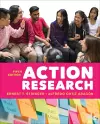
Action Research
2 authors - Paperback
£60.00
Ernest T. Stringer After an early career as a primary teacher and school principal, Ernie was a lecturer in education at Curtin University of Technology, in Western Australia. From the mid-1980s, based at Curtin’s Centre for Aboriginal Studies, he worked collaboratively with Aboriginal staff and community people to develop a wide variety of innovative and highly successful education and community development programs and services. His work with government departments, community-based agencies, business corporations, and local governments assisted them to work more effectively with Aboriginal people. In recent years, as visiting professor at the University of New Mexico and Texas A&M University and as visiting scholar at Cornell University, he taught research methods courses and/or engaged in projects with African American and Hispanic community and neighborhood groups. As a UNICEF consultant, he recently engaged in a major project to increase parent participation in schools in East Timor. He is author of Action Research (Sage, 2007), Action Research in Education (Pearson, 2008), Action Research in Health (with Bill Genat; Pearson, 2004), and Action Research in Human Services (with Rosalie Dwyer; Pearson, 2005). Until recently, he was a member of the editorial board of the Action Research Journal and past president of the Action Learning, Action Research Association (ALARA). Alfredo Ortiz Aragón Alfredo is an action researcher who designs and implements change processes to address pressing social and environmental concerns in support of equitable development. In the field he seeks to help organizations and movements that support processes of social change and environmental stewardship in order to be more effective and reflective in their work. In all of his work he uses methods that appeal to diverse learning styles but that also challenge dominant ways of seeing, knowing, and acting in the world that uphold unjust social rules and structures. He encourages all of his collaborators to reflectively “put themselves into the picture” and consciously participate in the changes they seek for others. He is willing to lead but also be vulnerable and open about what he and we know, and how we all might use our leadership and vulnerability to engage in honest conversations that help us support people in need in ways that are culturally relevant and potentially transformative. He is an associate professor at the Dreeben School of Education Graduate Studies Program at the University of the Incarnate Word in San Antonio, Texas, where he teaches qualitative and action research methods and design. His PhD is from the Institute of Development Studies at the University of Sussex, in the United Kingdom.